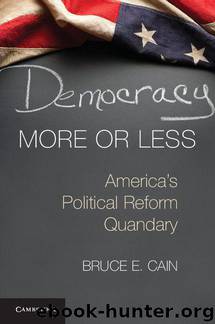Democracy More or Less: America's Political Reform Quandary (Cambridge Studies in Election Law and Democracy) by Bruce Cain

Author:Bruce Cain [Cain, Bruce]
Language: eng
Format: epub, azw3
Publisher: Cambridge University Press
Published: 2014-12-31T08:00:00+00:00
Supermajority Rules
Representation begins but does not end at the electoral phase. Whether representation is fair or not is only in small measure about the partisan or demographic descriptiveness of the legislators elected to office. The full translation of the public will into laws and policies also incorporate the actions of representatives in office. As with electoral fairness, the meaning of good legislative representation is contested. A democratic system can accommodate several styles of representation. The trustee model – that is, legislators exercising their own policy judgments and evaluated retrospectively by voters based on outcomes or personal qualities – is equally as democratic as a delegate model that expects legislators faithfully and without deviation to carry out the promises they made to voters during the election. The legitimacy of government authority stems from the democratic opportunity for voters to elect or unelect officials to a term of office, not from the compatibility with any particular theory of representation.
But as many political scientists and some economists have emphasized in recent years, all representative democracies have principal-agency problems (Miller, 2005; Kalt and Zupan, 1990). As discussed earlier, some arise when public officials allow personal material interests to interfere with their duties. But the electoral mandate can become altered or lost at the legislative phase for reasons other than self-enrichment. Sometimes postelectoral distortion can be traced to a formal feature, a legislative rule or process that limits the legislative majority. But it can also result from unequal influence through lobbying and advocacy. For populist reformers, any deviation from the majority electoral mandate is problematic. For pluralists, majoritarian consistency is less important than functional complementarity.
Fair representation is the compound effect of electoral and legislative actions. Some democratic designs are consistent at all stages of representation. The British Parliament is elected by single member simple majority rules and run by a simple majority design, without antimajoritarian features like the filibuster. There is no possibility of divided government as the prime minister is the leader of the majority party or coalition. To be sure, political coalitions usually have internal political constraints, but the formal separation of power in the United States incentivizes disagreement to a greater degree than in the UK. Most US legislatures incorporate such potentially antimajoritarian features as bicameralism and legislative committees with the power to amend and introduce bills. In this sense, US representation is less consistently majoritarian than a parliamentary system, making political fairness questions all the more complex and controversial.
A common assumption is that democracy operates by majority rule, but in fact, as we have noted already, that is not always true, and even when it is, majority rule can be implemented in many varied ways (a majority of those present, a majority of the membership, a majority in two consecutive votes, and so forth). In its most common form, this means that the winning option or candidate gets 50 percent plus 1 of the votes cast. This rule resonates with us because it ensures that the option favored by the larger faction prevails over the others.
Download
Democracy More or Less: America's Political Reform Quandary (Cambridge Studies in Election Law and Democracy) by Bruce Cain.azw3
This site does not store any files on its server. We only index and link to content provided by other sites. Please contact the content providers to delete copyright contents if any and email us, we'll remove relevant links or contents immediately.
| Anthropology | Archaeology |
| Philosophy | Politics & Government |
| Social Sciences | Sociology |
| Women's Studies |
The Secret History by Donna Tartt(19053)
The Social Justice Warrior Handbook by Lisa De Pasquale(12187)
Thirteen Reasons Why by Jay Asher(8893)
This Is How You Lose Her by Junot Diaz(6877)
Weapons of Math Destruction by Cathy O'Neil(6265)
Zero to One by Peter Thiel(5786)
Beartown by Fredrik Backman(5737)
The Myth of the Strong Leader by Archie Brown(5500)
The Fire Next Time by James Baldwin(5431)
How Democracies Die by Steven Levitsky & Daniel Ziblatt(5215)
Promise Me, Dad by Joe Biden(5141)
Stone's Rules by Roger Stone(5081)
A Higher Loyalty: Truth, Lies, and Leadership by James Comey(4954)
100 Deadly Skills by Clint Emerson(4921)
Rise and Kill First by Ronen Bergman(4779)
Secrecy World by Jake Bernstein(4741)
The David Icke Guide to the Global Conspiracy (and how to end it) by David Icke(4709)
The Farm by Tom Rob Smith(4502)
The Doomsday Machine by Daniel Ellsberg(4484)
